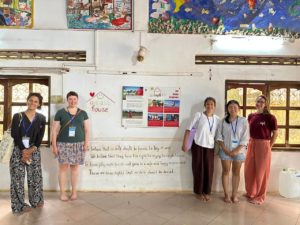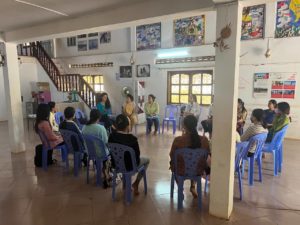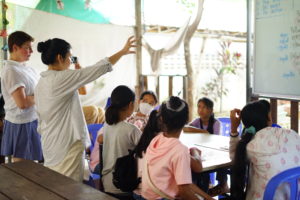
The Green Flow Project
In July 2023, Anjali House opened their doors to a unique and innovative project: GreenFlow. This initiative includes workshops in sexual and reproductive health for girls, boys, parents/carers and teachers, with the aim of promoting empathy and understanding for students navigating through adolescence.
The key educators for this initiative are Sovanvotey Hok, Founder of Green Lady Cambodia, and Dr Alissa Ambrose, a doctor from the UK with an interest in sexual health. Ms Sotheavy At, Founder of Think Plastic, conducted workshops targeted at plastic waste from sexual and reproductive health products. In total, nearly 100 kids and around 20 parents/ carers and teachers have taken part in a variety of workshops and activities over the course of three weeks. Feedback collected from each session shows an overall positive experience for all participants.
The project also involves numerous creative learning methods, from craft work to origami and a collaborative filmmaking approach that will take shape later in the year. This initiative is being piloted by Stop the Shame Period and Green Shoots Foundation, which has been a partner of Anjali House since 2016 who was the project coordinator and in charge of monitoring and evaluation for the pilot project.
Menstrual Health in Cambodia – overview of the situation
Menstrual health and awareness plays a crucial role in the health of individuals. Menstruation impacts various aspects of a girl’s life. It affects access to education, social life, physical and mental health. To break the stigma surrounding menstruation in Cambodia we must ensure access to menstrual hygiene products and facilities and mental support.
In the last decade, the Cambodian government made an effort to improve the situation. According to UNICEF Cambodia, since 2018 the School Health Department of the Ministry of Education, Youth, and Sports implemented a weekly health hour in public schools. During this class girls and boys in grade 5 and above would study about their growth and development.
By the end of 2021, the same ministry conducted refresher trainings on the Minimum Requirements on WASH (Water, Sanitation and Hygiene) in schools. The measures received funding from the UK Government’s Foreign, Commonwealth & Development Offices. They also benefited technical guidance from UNICEF. These requirements test a school’s drinking water supply. They check the ratio of bathrooms to students, separated by gender. They verify the presence of menstrual hygiene management facilities, supplies and education.

Still, a Plos Global Public Health research published in 2022 nuanced these improvements. It shows that, in rural areas, girls still experience fear, shyness and discomfort (FSD) related to menstruation. This would be the result of a lack of information, of mental support and of access to facilities.
The authors also claim that the stigmatization of menstruation lowers hygienic standards. They explain that “Supporting the dignity of adolescent girls must include efforts to eliminate FSD associated with menstruation”. Hence, reductions in FSD should be a key indicator for the success of future interventions on menstrual health in Cambodia.
About the initiative of Anjali House and Stop The Shame Period
What is Stop the Shame Period?
Stop the Shame Period is a registered non-profit association. They aim to build empathy, awareness and community on menstrual health in Cambodia. To do so, they develop sustainable solutions to the stigma and taboos around menstruation. This project, GreenFlow was piloted by Stop the Shame Period and Green Shoots Foundation, who has been a partner of Anjali House since 2016. Green Shoots was the project coordinator and in charge of monitoring and evaluation of this pilot program.
This July, the association organized workshops at Anjali House. They covered sexual and reproductive health and rights (SRHR) and environmental sustainability. Green Lady Cambodia and Think Plastic conducted these classes. Local teachers and a volunteer sexual health doctor assisted.
The goal of the partnership is to make Anjali House a safe environment for the students. It is a nice opportunity to raise awareness on both physical and mental health in our community.

Intervention directed towards the students
During this project several interventions targeted the students, girls as well as boys. More than 100 students from 11 years old and above participated.
The workshops covered anatomy, physical and emotional changes that youths experience during puberty. The idea was to encourage girls to have positive attitudes towards changing bodies. We also wanted to make sure that boys would have an empathetic response.
Family intervention
It was also important to us to organize workshops targeting the parents. Family is the first sphere of socializing of a child. Thus, it is necessary to inform them on these topics. We wanted particularly to highlight the importance of mental support.
It provided a platform in which they could discuss the changes in their children. Additionally, many women had questions about their own menstrual health. The workshop gave them an opportunity to air their concern or ask questions they have not had the answer to. By communicating openly, they can be more comfortable discussing such issues when their children face issues.

Institutional Intervention
The idea behind a training for the teacher was to address gender equalities and normalizing menstruation in the school environment. In addition, it was necessary to give them practical advice and preparedness on how to treat this matter whenever it would be raised in class.
This discussion had practical elements such as how to set up the bathrooms, proper disposal systems, and clean water and soap. The goal is to provide an environment where students can manage their menstrual health.
Likewise, staff had an opportunity to speak openly about such topics to decrease stigma. In effect, they can provide inclusive and supportive environments. They can communicate in a way free from shame or embarrassment.
Sustainability
Last but not least, we organized workshops on sustainability. The goal was to discuss how to create a more sustainable future. We talked about avoiding the waste resulting from single use pads and tampons. We can replace them with washable ones. We discussed how to avoid plastic in daily life.
The girls will also be given reusable pads. By using reusable products, students can reduce the amount of non-biodegradable products that end up in landfills.

To conclude, this partnership was very enriching for Anjali House. We got the opportunity to spread essential knowledge and awareness around our community. It was a chance to put in place better menstrual awareness in the school environment itself. In the bathroom, we now make sure that there is a trash can in each cabin, we put pads at disposal in case of need etc.
Of course we would like to say a big thank you to Stop the Shame Period, it was a huge pleasure to have you with us. We are looking forward to working with you again in the future.
